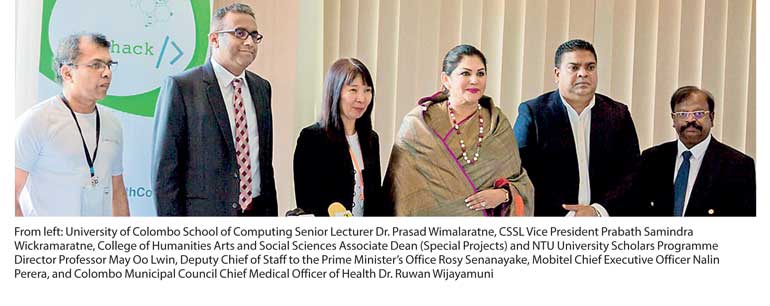Wednesday Feb 18, 2026
Wednesday Feb 18, 2026
Friday, 24 November 2017 00:00 - - {{hitsCtrl.values.hits}}
 By Darshana Abayasingha
By Darshana Abayasingha
Epihack Sri Lanka, the country’s first-ever program to develop, integrate and improve technological solutions to detect and reduce the impact of dengue in the country concluded in Colombo on Friday.
The five-day program drew 55 experts from 11 countries, with teams presenting concepts and innovations to observers and stakeholders on Friday, as it sought to develop a cutting-edge participatory reporting tool with prevention strategies to combat dengue, plus, bridge communication gaps necessary for effective control.
Epihack Sri Lanka was organised by the Nanyang Technological University Singapore together with the Colombo Municipal Council, the University of Colombo School of Computing and the Computer Society of Sri Lanka.
Speaking to Daily FT, Professor May Lwin from NTU Singapore, said that Colombo was chosen because of its ongoing experience with dengue and digital surveillance, adding that the program was successful as it had pushed the envelope in terms of the manner in which surveillance is done and developing smarter automated systems to health the public services and health sector to combat the spread of the disease. She also pointed to excellent community spirits and family-centred values amongst Sri Lankans, which Lwin believes will give locals an advantage in employing technology for community-based action in comparison to the rest of the Asian region. Epihack Sri Lanka builds on an existing mobile platform used by Public Health inspectors in Colombo, as government and health officials, developers in the country and the rest of the globe discuss and prototype digital tools to prevent the spread of dengue. The solutions created at Epihack will be open-sourced and available for any platform in the fight against infectious diseases around the world. Digital surveillance is a relatively new arena and is only about seven to eight years old it was said at the forum, with Sri Lanka already an active participant.
“The digital tools developed here can help doctors, public health officials and workers to combat the disease and react to it faster, plus, prioritise actions. In the future, information can flow directly from general practitioners and laboratories and that can be really quick, and then the country and authorities will have a good idea as early as possible when there is a threat of dengue,” said Dr. Craig Dalton speaking to Daily FT. Drawing upon examples from his home country, Australia, Dalton said just 400 people started reporting on flu symptoms using mobile phones in 2006, which has now grown to over 28,000 helping government to track the spread of disease and how well vaccines respond. Dalton believes that adoption should be easy in Sri Lanka given the rate of uptake of mobile phones in the country.